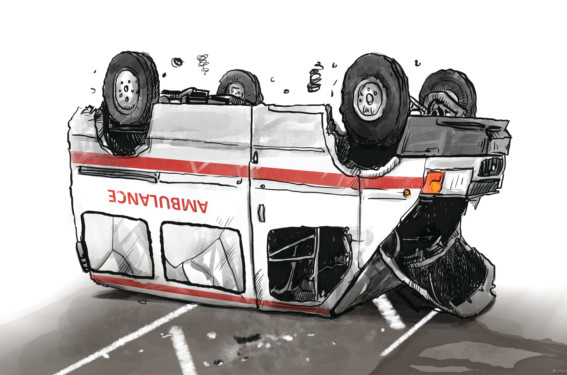
As the first anniversary of the Gaza conflict approaches, the battle for the narrative is again raging. The United Nations’ commission of inquiry into the conflict released its report to the human rights council in Geneva last week. Israel’s government, which refused to cooperate with the investigation, has already denounced the report. Its own findings have exonerated the Israeli army of any wrongdoing during ‘Operation Protective Edge’ and the army’s investigation into the deaths of four boys, killed by shelling while on a Gaza beach last July, exonerated the soldiers involved. It was the legal equivalent of marking your own homework.
For Palestinians in Gaza, however, the continuing impact of the conflict is nothing short of catastrophic. The numbers speak for themselves: 17 hospitals, 56 primary healthcare facilities and 45 ambulances were damaged or destroyed and the total cost of the conflict to Gaza’s health care system is estimated at $50 million (Dh183.9 million). Sixteen health care workers were killed and 83, most of them ambulance drivers and volunteers, were injured. In total, more than 2,200 Palestinians were killed, at least 500 of whom were children, and more than 10,000 wounded.
New figures show that medical assistance was obstructed for 511 of those who died last year, including 67 children. Obstacles such as live military zones, Israeli checkpoints and a lack of coordination meant that these individuals, all alive when reported to ambulance services, either died before the paramedics were able to access them or before they reached hospital after being picked up.
Behind these statistics are devastating human stories. Bader, a seven-year-old boy from Khuza’a, was wounded by shrapnel and died after ambulances were initially unable to reach him for four hours and were then held at a checkpoint on way to the hospital. From the destruction of Al Wafa — Gaza’s only rehabilitation hospital — to the deaths of ambulance drivers and volunteer medics, even those seeking to aid the injured were not protected, placing them on the front lines of the conflict.
It is crucial that respect for the neutrality of medical space is observed by all armed actors. Rumours persist of Gaza’s Al Shifa hospital being used as a Hamas “command centre” and Israel has released footage claiming to show that Hamas commandeered ambulances and launched attacks from hospital compounds during the conflict. If true, these are unacceptable breaches of international law that must be brought to account.
But only an independent investigation that has access to Gaza can verify or dispel these accusations, hence the absurdity of Israel not allowing the UN commission in. The violation of the sanctity of hospitals, whether through military use or targeting, is a war crime either way, and must be scrutinised.
After the UN fact-finding mission, which followed the 2008-09 ‘Operation Cast Lead’, the international community failed to adhere to its recommendations in any meaningful way. If the international community fails once more to respond to such attacks, it risks further eroding one of the most fundamental norms of international law. Impunity for attacks on healthcare in last year’s conflict would not only be a gross injustice for the victims, but would send the message that no place is safe for the building of a new hospital, no doctor or nurse safe to treat the wounded, and no ambulance safe to transport injured civilians away from conflict zones to receive care.
Governments must not only make good on their promises to rebuild Gaza’s shattered healthcare system, but must also ensure that they never have to do so again. Reaffirming the protected status of hospitals in the fourth Geneva convention and ensuring the prevention of future attacks of this kind by tackling impunity are legal, political and medical imperatives for the international community.
The UN’s commission of inquiry was established to investigate violations of international law during the conflict, to identify those responsible, and to make recommendations for mechanisms by which violators can be held to account. It has highlighted the inadequacy of existing accountability mechanisms within Israel to investigate and address potential crimes. As states consider this report in Geneva, those with the necessary international clout, including the United Kingdom, France and other European states, must lead the way to ending impunity. If accountability is to be achieved, either the existing mechanisms must be reformed and improved, or alternative international mechanisms, including the international criminal court, must be supported.
Last month, the British Foreign Secretary Philip Hammond spoke of “international outrage” over the barrel-bombing of hospitals in Syria by the Bashar Al Assad regime and promised to “bring those involved in these criminal acts to justice”. Whether struck by a precision-guided missile or a crude barrel bomb, the targeting of any hospital is deserving of equal opprobrium and international action to hold those responsible to account.
Gaza has endured six conflicts in the past four years. Only by shouldering their responsibilities to uphold the protected status of hospitals and medical personnel under international law can governments avoid repeating the destruction we saw last summer once more.
— Guardian News & Media Ltd
Helena Kennedy QC is a Labour peer and was chair of the Power Inquiry into the reform of democracy.








